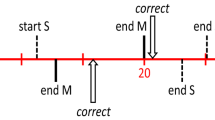Abstract
The aim of this study is to highlight the influence of the socio-relational context in expert-novice problem solving situation. We assume that a hole range of interactive organizations coexist and vary as a function of the asymmetry of the relationships affected by the mastery of the task and differences in partners status. Thirty six first graders aged 6;6 (18 hight achievers and 18 low achievers) were observed during a construction task. Hight achieving experts were assigned to low achieving novices and vice-versa. As predicted, when hight achieving status was associeted with task related expertise (reinforced asymmetry) the interactive dynamic was chiefly caracterised by guidance/tutoring. In contrast, when low achieving status was associated with task related expertise (counter balanced asymmetry), a variety of dynamics were abserved most of which were either cooperative or exhibited reverse guidance by the hight achieving novice. Guidance management by the experts also differed between the reinforced and counter balanced conditions. The findings argue for a pluridimensional approach to socio-cognitive modes of aquisition.
Similar content being viewed by others
References
Azmitia, M. (1988). Peer interaction and problem solving: When are two heads better than one?Child Development, 59, 87–96.
Beaudichon, J. (1982).La communication sociale chez l’enfant. Paris: Presses Universitaires de France.
Beaudichon, J., Verba, M., & Winnykamen, F. (1988) Interactions sociales et acquisition de connaissances chez l’enfant. Une approche pluridimensionnelle.Revue Internationale de Psychologie Sociale, 1, 129–141.
Bruner, J. (1985). Vygotsky: A historical and conceptual perspective. In J. Wertsch (Ed.),Culture Communication and Cognition (pp. 21–34). Cambridge, Mass: Cambridge University Press.
Cooper, C. R. (1980). Development of collaboration problem solving among preschool children.Developmental Psychology, 16, 433–440.
Cooper, C. R., Marquis, A., & Edwards, D. (1986). Four perspectives on peer learning among elementary school children. In E. Mueller & C. Cooper (Eds.),Process and outcome in peer interaction, (pp. 267–299). New York: Academic Press.
Doise, W. (1988). Régulations sociales des opérations cognitives. In R. A. Hinde, A.-N. Perret-Clermont & J. Stevenson-Hinde (Eds.),Relations interpersonnelles et développement des savoirs, (pp. 419–438). Cousset (Suisse): Delval.
Doise, W., & Mugny, B. (1981).Le développement social de l’intelligence. Paris: Inter-éditions.
Ellis, S., & Rogoff, B. (1982). The strategy and efficacy of child versus adult teacher.Child Development, 53, 730–735.
Ellis, S., & Rogoff, B. (1986). Problem solving in childrens management of instruction. In E. Mueller & C. Cooper (Eds.),Process and outcome in peer relationship, (pp. 301–324). New York: Academic Press.
Foot, H. C., Shute, R. H., Morgan, M. J., & Barron, A. M. (1990). Theoretical issues in peer tutoring. In H. C. Foot, M. J. Morgan & R. H. Shute (Eds.),Children helping children, (pp. 65–92). New York: John Wiley & Sons.
Garton, A. L. (1984). Social interaction and cognitive growth.British Journal of Developmental Psychology, 2, 269–274.
Gilly, M. (1980).Maître-élève. Rôles institutionnels et représentations. Paris: Presses Universitaires de France.
Gilly, M. (1988). Interactions entre pairs et constructions cognitives: travaux expérimentaux de laboratoire au terrain pédagogique.European Journal of Psychology of Education, n.o Hors série. «Le fonctionnement de l’enfant à l’école: bilans et perspectives psychologiques et didactiques», 127–138.
Perret-Clermont, A.-N. (1979).La construction de l’intelligence dans l’interaction sociale. Berne: Peter Lang.
Verba, M. (1984). Observation sur le terrain: une analyse de la dynamique des interactions sociales. Université de Poitiers,Bulletin de Psychologie du Centre Ouest, 14, 13–25.
Verba, M. (1985). Peer interaction: Organization of shared activities among 12 to 24 months olds. Presented at the ISSBD’s eight biennal meeting, July 6–10, Tours.
Verba, M., Stambak, M., & Sinclair, H. (1982). Physical knowledge and social interaction in children (from 18–24 months of age). In G. E. Forman (Ed.),Action and thought, (pp. 267–296). New York: Academic Press.
Verba, M., & Winnykamen, F. (1988). Transmission of know-how in peer expert novice interaction. Oral communication,ISSBD, Budapest, June.
Vygotsky, L. S. (1978).Mind in society: The development of higher psychological processes. Cambridge, Mass.: Harvard University Press.
Wertsch, J., & Hickmann, M. (1987). Problem solving in social interaction: a microgenetic analysis. In M. Hickmann (Ed.),Social functional approaches to laanguages and thought, (pp.251–266). Orlando: Academic Press.
Wertsch, J., & Stone, C. A. (1985). The concept of internalization in Vigotsky’s account of higher mental functions. In J. Wertsch (Ed.),Culture, Communication and Cognition. Cambridge: University Press.
Winnykamen, F. (1990).Apprendre en imitant? Paris: Presses Universitaires de France.
Wood, D., Ross, G., & Bruner, J. (1976). The role of tutoring in problem solving.Journal of Child Psychology and Psychiatry, 17, 89–100.
Author information
Authors and Affiliations
Additional information
The study reported in this article was conducted in a research unit affiliated with the C.N.R.S. (URA 1353).
Rights and permissions
About this article
Cite this article
Verba, M., Winnykamen, F. Expert-novice interactions: Influence of partner status. Eur J Psychol Educ 7, 61–71 (1992). https://doi.org/10.1007/BF03172822
Received:
Revised:
Issue Date:
DOI: https://doi.org/10.1007/BF03172822




